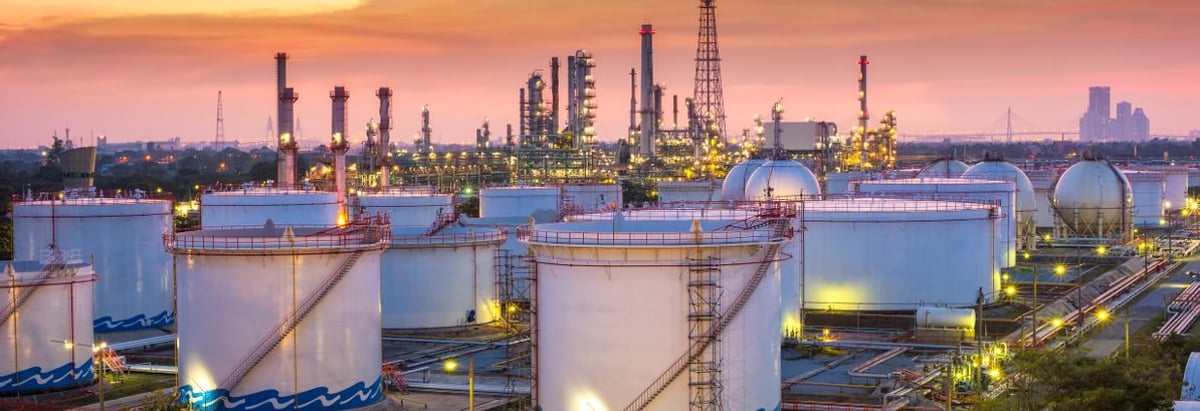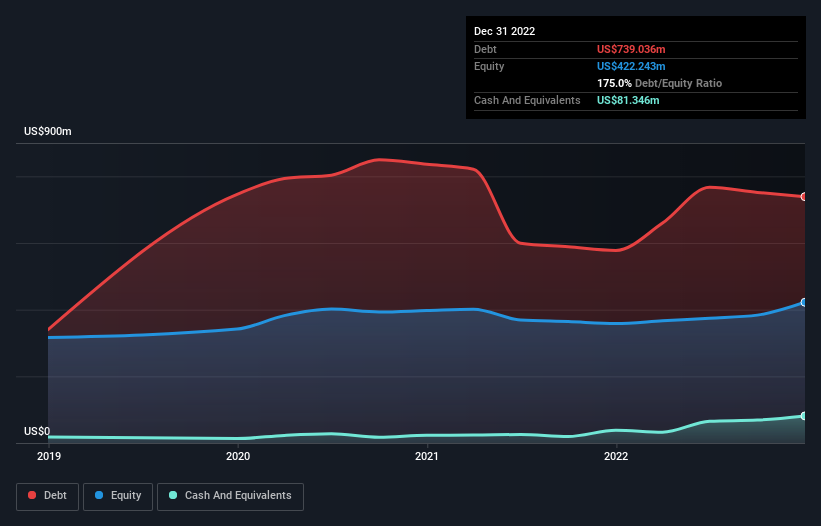
Howard Marks put it nicely when he said that, rather than worrying about share price volatility, 'The possibility of permanent loss is the risk I worry about... and every practical investor I know worries about.' When we think about how risky a company is, we always like to look at its use of debt, since debt overload can lead to ruin. We note that Okeanis Eco Tankers Corp. (OB:OET) does have debt on its balance sheet. But the more important question is: how much risk is that debt creating?
When Is Debt Dangerous?
Debt is a tool to help businesses grow, but if a business is incapable of paying off its lenders, then it exists at their mercy. Ultimately, if the company can't fulfill its legal obligations to repay debt, shareholders could walk away with nothing. While that is not too common, we often do see indebted companies permanently diluting shareholders because lenders force them to raise capital at a distressed price. Of course, plenty of companies use debt to fund growth, without any negative consequences. The first step when considering a company's debt levels is to consider its cash and debt together.
See our latest analysis for Okeanis Eco Tankers
How Much Debt Does Okeanis Eco Tankers Carry?
The image below, which you can click on for greater detail, shows that at December 2022 Okeanis Eco Tankers had debt of US$739.0m, up from US$577.7m in one year. On the flip side, it has US$81.3m in cash leading to net debt of about US$657.7m.

How Strong Is Okeanis Eco Tankers' Balance Sheet?
Zooming in on the latest balance sheet data, we can see that Okeanis Eco Tankers had liabilities of US$92.9m due within 12 months and liabilities of US$668.3m due beyond that. Offsetting these obligations, it had cash of US$81.3m as well as receivables valued at US$49.7m due within 12 months. So its liabilities outweigh the sum of its cash and (near-term) receivables by US$630.0m.
This deficit is considerable relative to its market capitalization of US$819.3m, so it does suggest shareholders should keep an eye on Okeanis Eco Tankers' use of debt. This suggests shareholders would be heavily diluted if the company needed to shore up its balance sheet in a hurry.
We measure a company's debt load relative to its earnings power by looking at its net debt divided by its earnings before interest, tax, depreciation, and amortization (EBITDA) and by calculating how easily its earnings before interest and tax (EBIT) cover its interest expense (interest cover). This way, we consider both the absolute quantum of the debt, as well as the interest rates paid on it.
Okeanis Eco Tankers has a debt to EBITDA ratio of 4.5 and its EBIT covered its interest expense 2.9 times. This suggests that while the debt levels are significant, we'd stop short of calling them problematic. The silver lining is that Okeanis Eco Tankers grew its EBIT by 245% last year, which nourishing like the idealism of youth. If it can keep walking that path it will be in a position to shed its debt with relative ease. The balance sheet is clearly the area to focus on when you are analysing debt. But ultimately the future profitability of the business will decide if Okeanis Eco Tankers can strengthen its balance sheet over time. So if you're focused on the future you can check out this free report showing analyst profit forecasts.
Finally, while the tax-man may adore accounting profits, lenders only accept cold hard cash. So we always check how much of that EBIT is translated into free cash flow. Over the last three years, Okeanis Eco Tankers saw substantial negative free cash flow, in total. While investors are no doubt expecting a reversal of that situation in due course, it clearly does mean its use of debt is more risky.
Our View
Mulling over Okeanis Eco Tankers's attempt at converting EBIT to free cash flow, we're certainly not enthusiastic. But on the bright side, its EBIT growth rate is a good sign, and makes us more optimistic. Once we consider all the factors above, together, it seems to us that Okeanis Eco Tankers's debt is making it a bit risky. Some people like that sort of risk, but we're mindful of the potential pitfalls, so we'd probably prefer it carry less debt. When analysing debt levels, the balance sheet is the obvious place to start. However, not all investment risk resides within the balance sheet - far from it. To that end, you should be aware of the 1 warning sign we've spotted with Okeanis Eco Tankers .
If you're interested in investing in businesses that can grow profits without the burden of debt, then check out this free list of growing businesses that have net cash on the balance sheet.
New: AI Stock Screener & Alerts
Our new AI Stock Screener scans the market every day to uncover opportunities.
• Dividend Powerhouses (3%+ Yield)
• Undervalued Small Caps with Insider Buying
• High growth Tech and AI Companies
Or build your own from over 50 metrics.
Have feedback on this article? Concerned about the content? Get in touch with us directly. Alternatively, email editorial-team (at) simplywallst.com.
This article by Simply Wall St is general in nature. We provide commentary based on historical data and analyst forecasts only using an unbiased methodology and our articles are not intended to be financial advice. It does not constitute a recommendation to buy or sell any stock, and does not take account of your objectives, or your financial situation. We aim to bring you long-term focused analysis driven by fundamental data. Note that our analysis may not factor in the latest price-sensitive company announcements or qualitative material. Simply Wall St has no position in any stocks mentioned.
About OB:OET
Okeanis Eco Tankers
A shipping company, owns and operates tanker vessels worldwide.
Good value with adequate balance sheet and pays a dividend.
Similar Companies
Market Insights
Community Narratives



